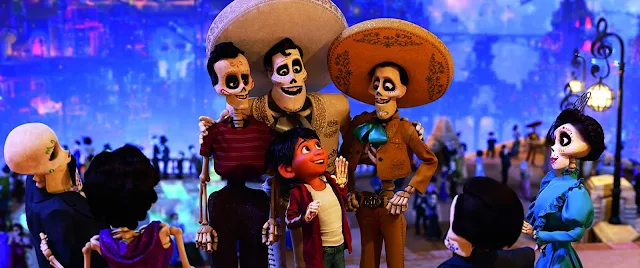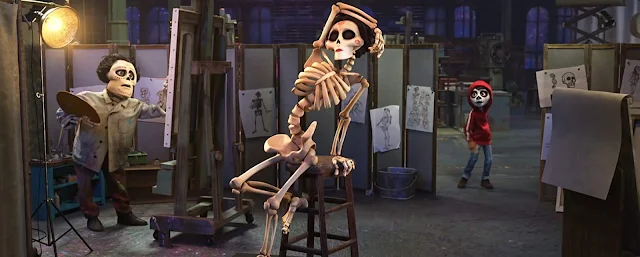 |
| Roman Griffin Davis, Taika Waititi, and Scarlett Johansson in Jojo Rabbit |
Cast: Roman Griffin Davis, Thomasin McKenzie, Scarlett Johansson, Taika Waititi, Sam Rockwell, Rebel Wilson, Alfie Allen, Stephen Merchant, Archie Yates. Screenplay: Taika Waititi, based on a novel by Christine Leunens. Cinematography: Mihai Malaimare Jr. Production design: Ra Vincent. Film editing: Tom Eagles. Music: Michael Giacchino.
Taika Waititi's brilliant, queasy comedy Jojo Rabbit might be seen as a parody of the feel-good movie -- the ability to tack a happy ending on even a story about Nazism. Not that the end of Jojo Rabbit is, objectively regarded, happy. We're left with Jojo (Roman Griffin Davis) and Elsa (Thomasin McKenzie) as street orphans in a defeated Germany. But they're dancing, which is what Elsa wanted to do when the war ended, and that kind of makes everything right. Fortunately, our awareness that the film is a fantasia on dark themes, belonging in that category of movies like Pan's Labyrinth (Guillermo del Toro, 2006) that fuse fairy tale elements and a childlike vision with real world horrors, is set early on, when we discover that Jojo has an imaginary friend, none other than Adolf Hitler (Waititi). And that the brutality of Nazis is being caricatured by actors like Sam Rockwell and Rebel Wilson. Jojo is a naïf in a hard and horrible world, which we see through his innocent eyes, just as we see Wonderland (a place of lunacy and cruelty) through the innocent eyes of Alice. It takes nothing away from the fine performances of young Davis and McKenzie, or from the darkly hilarious ones of Waititi, Rockwell, and Wilson, to say that the heart of the film, giving a performance that took my breath away, was Scarlett Johansson, who made beautiful sense of a role that shouldn't have worked at all: Jojo's mother, the secret resistance worker who tolerates her son's adulation of the Nazis while at the same time hiding a young Jewish girl in the walls of their house. We see her through three distinct points of view: Jojo's, Elsa's, and another that gradually becomes our own, and the outcome of her story, when these points of view finally merge, is heartbreaking even in the midst of the caricature of the real world that the film presents. The audacity of Waititi's movie has been likened to that of Life Is Beautiful (Roberto Benigni, 1999), a movie I hated, so I can understand the critics who thought Jojo Rabbit went too far, that it didn't cohere, but I can't entirely agree.


































